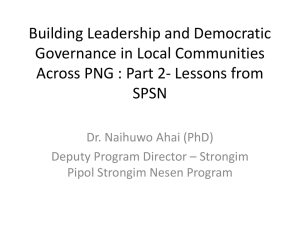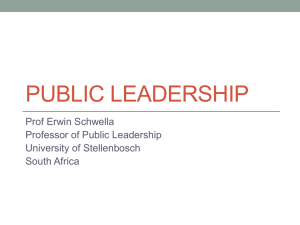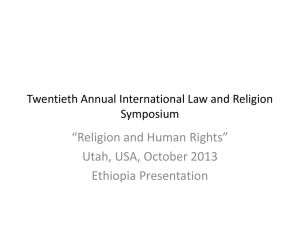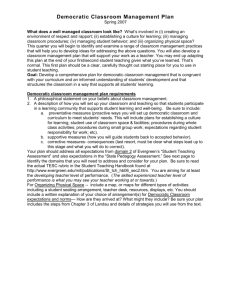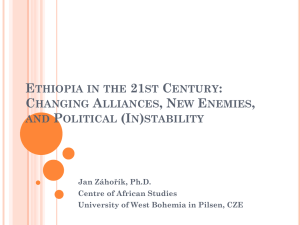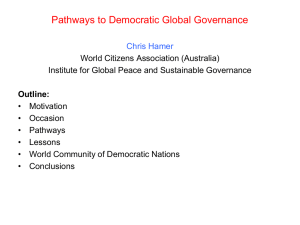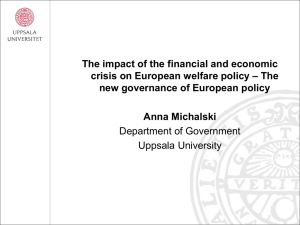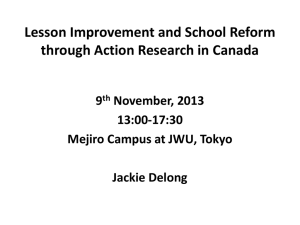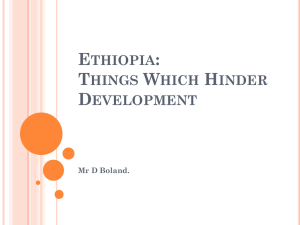SDG Justification (4)
advertisement
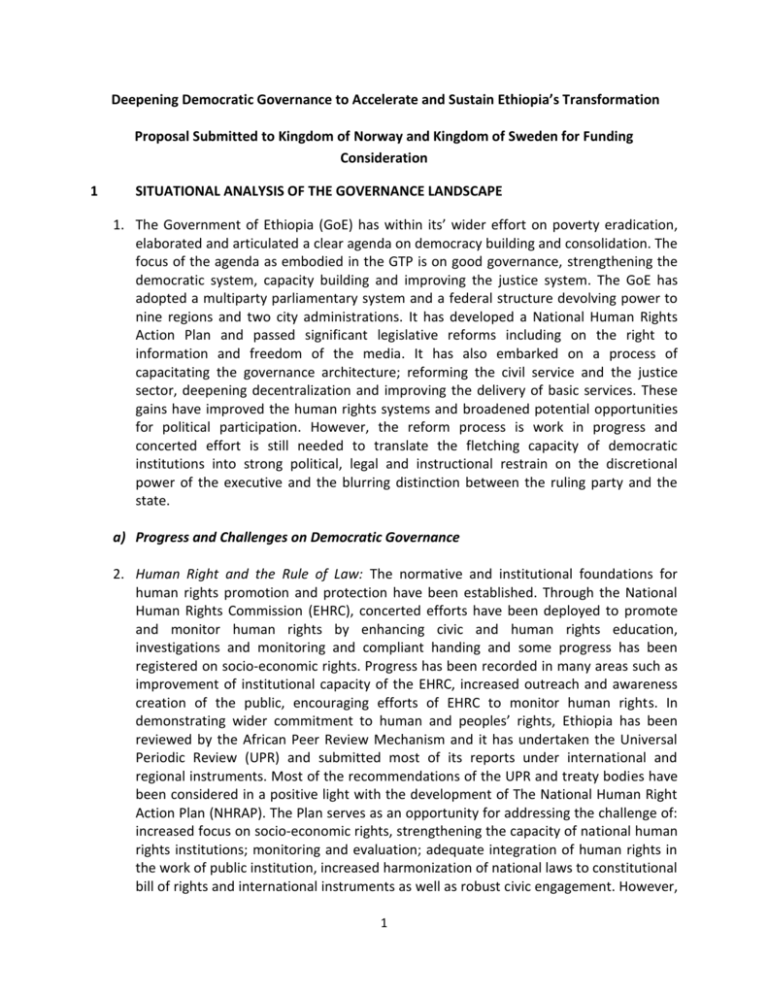
Deepening Democratic Governance to Accelerate and Sustain Ethiopia’s Transformation Proposal Submitted to Kingdom of Norway and Kingdom of Sweden for Funding Consideration 1 SITUATIONAL ANALYSIS OF THE GOVERNANCE LANDSCAPE 1. The Government of Ethiopia (GoE) has within its’ wider effort on poverty eradication, elaborated and articulated a clear agenda on democracy building and consolidation. The focus of the agenda as embodied in the GTP is on good governance, strengthening the democratic system, capacity building and improving the justice system. The GoE has adopted a multiparty parliamentary system and a federal structure devolving power to nine regions and two city administrations. It has developed a National Human Rights Action Plan and passed significant legislative reforms including on the right to information and freedom of the media. It has also embarked on a process of capacitating the governance architecture; reforming the civil service and the justice sector, deepening decentralization and improving the delivery of basic services. These gains have improved the human rights systems and broadened potential opportunities for political participation. However, the reform process is work in progress and concerted effort is still needed to translate the fletching capacity of democratic institutions into strong political, legal and instructional restrain on the discretional power of the executive and the blurring distinction between the ruling party and the state. a) Progress and Challenges on Democratic Governance 2. Human Right and the Rule of Law: The normative and institutional foundations for human rights promotion and protection have been established. Through the National Human Rights Commission (EHRC), concerted efforts have been deployed to promote and monitor human rights by enhancing civic and human rights education, investigations and monitoring and compliant handing and some progress has been registered on socio-economic rights. Progress has been recorded in many areas such as improvement of institutional capacity of the EHRC, increased outreach and awareness creation of the public, encouraging efforts of EHRC to monitor human rights. In demonstrating wider commitment to human and peoples’ rights, Ethiopia has been reviewed by the African Peer Review Mechanism and it has undertaken the Universal Periodic Review (UPR) and submitted most of its reports under international and regional instruments. Most of the recommendations of the UPR and treaty bodies have been considered in a positive light with the development of The National Human Right Action Plan (NHRAP). The Plan serves as an opportunity for addressing the challenge of: increased focus on socio-economic rights, strengthening the capacity of national human rights institutions; monitoring and evaluation; adequate integration of human rights in the work of public institution, increased harmonization of national laws to constitutional bill of rights and international instruments as well as robust civic engagement. However, 1 advancing the human rights agenda requires focus attention on enforcement and protection. The EHRC has made some progress in this direction. Implementation and monitoring of NHRAP and supporting the Ombudsman in overseeing the effective implementation of the Freedom of Information (FoI) law provide opportunities to sustain the positive trend. 3. Progress has also been made on improving the administration and operational systems of judicial institutions, in particular the courts, through the implementation of the National Court Reform Program. Improvements are evident in some areas such as computerization of the judicial database, which has reduced the backlog of court cases. Commendable progress has also been made in increasing access to justice particularly for the vulnerable through the establishment of legal aid centers. However popular perception of a fair, speedy, independent justice has yet to develop and there is need to improve the quality of legal aid through development of proper policy and regulatory framework; putting in place systems, procedures and processes; standardization of legal aid services; establishing coordination, regulatory and accountability mechanisms; and the establishment of legal aid providers’ forum to share experiences and exchange best practices. 4. Transparency and accountability: The GoE promotes zero tolerance on corruption in the public sector and has established the Federal Ethics and Anticorruption Commission (FEACC) to undertake preventive, investigation and prosecution measures. While FEACC has played an important role in combating corruption through implementation of several measures, efforts are need to strengthen the capacity of FEACC and the adoption of a systemic approach that is grounded on improving integrity by mainstreaming of anticorruption measures in policies, institutionalization of anticorruption measures in the civil service and public institutions, increase involvement of civil society in anticorruption initiatives and the establishment of mechanisms for systematic and sectoral monitoring of corruption trends in the country. 5. Elections: The conduct of genuine periodic elections has become a key feature of democracy in Ethiopia. The FDRE Constitution establishes a framework for multi-party parliamentary democracy and commensurate civil and political rights, guaranteeing Ethiopians the right to express political choice under a federal system.1 Drawing from the lessons of the previous elections, several measures have been taken to improve the management and integrity of subsequent elections. For example, the amendment of the Electoral Law, Amendment of the Political Parties Registration Proclamation, agreement on an Electoral Code of Conduct for Political parties aimed at ensuring conduct of peaceful elections, adoption of a formula for use of state media in campaign as well as allocation of state fund for political parties for the first time in the country’s history. The capacity of the National Election Board (NEBE) to competently and efficiently administer free, fair and credible elections continued to increase. The conduct of regular elections, 1 Art 38, FDRE Constitution 2 measures taken to address concerns of political parties and effective administration by the NEBE is considered to be a positive step in the country’s evolving democracy. 6. Despite these progress, there are evolving challenges and critical capacity gaps which amongst others include: effective decentralization of NEBE to the sub national level, political pluralism, the perception of independence of the Electoral Administration, participation of civil society in the electoral process and the approach to election boundary districting, which was due for review in 2010. Moreover is it imperative to ensure that electoral management is closely linked with and informed by conflict management including the handling of electoral complaints cognizance of the respective mandates of the Judiciary, the Grievance Hearing Committees and the Joint Council for Political Parties. 7. Political Parties and Representation: Political parties have a key role to play in ensuring peaceful elections and the development of a peaceful democratic culture in Ethiopia. Ethiopia has opened up its political space to competing political parties since the adoption of the 1995 Constitution which provides for the right to freedom of association2. Increasing numbers of political parties have been established and continue to compete for power. Commendable efforts have also been made by the government in provision of state funding to political parties in 2010 and access to media for campaign. More work is needed to further consolidate ongoing efforts of strengthening the capacities of political parties consistent with a democratic culture as envisaged in the Constitution through emphasis on organizational structures, internal governance and processes, political party dialogue and engagement, articulation and analysis of programs and policies, constituency building and engagement, resource mobilization among others. 8. Press and Media Freedom: The Growth and Transformation Plan (Policy Matrix) addresses the important role of the media in a democratic society and has specific outputs and targets for improving and strengthening laws for the media’s expansion and regulation and the professional competences of the media. The Ethiopian Constitution guarantees freedom of press and the operational environment to entrench this right is work in progress. For example, whilst the Proclamation upholds constitutional protection against censorship, it also facilitates self-censorship by criminalizing false reporting. There is need to strengthen the media’s role in providing information to citizens through institutional support to the media regulatory bodies and associations; training in international law and standards to which countries’ media laws must comply; strengthening media professionalism through the development of effective mechanisms of self-regulation; and supporting the media’s capabilities to reflect and represent the diversity of views and interests in society, including those of marginalized groups. 2 Art 31 , FDRE Constitution , Proc 1/1995 3 9. Civic engagement: Whilst GoE has committed to civic engagement, civic space has reduced since the enactment of the Charities and Society Proclamation; especially for CSOs working on issues on governance and human rights. Concerted effort is need both to improve the operating environment (adaptation of the law) and strengthening the capacity of CSOS. Possible areas of engagement to address these concerns could include support for ongoing integrated civic education programs covering human rights, ethics and voter education (civic educational manuals targeting marginalizes and vulnerable); capacity for human rights education monitoring and reporting; and supporting civic education programs implemented by CSOs. Another important area to focus attention is the ability of CSOs and CBOs to effectively participate in engaging and monitoring governance; their abilities to advocate and the mechanisms for them to be held accountable to the people whose interests they represent. 10. Gender: A number of legal instruments (Family Law and the Criminal Code, the Ethiopia National Policy for Women and the National Action Plan for Gender Equality) have been adopted in response to the GoE strong commitment to gender equality and women’s human rights. However challenges of effective mechanism for mainstreaming and accountability of Gender equality, low levels of literacy, lack of awareness and limited capacity of law enforcement organs persist. 11. Managing Diversity: While the Constitution provides a sufficient framework for a federal system, the successful management of this federalism requires systems at the national and local level to mediate competing authorities and concurrent responsibilities. As Ethiopian African Peer Review Mechanism (APRM) Country Report (p269) notes, managing diversity and ensuring all-inclusive governance has to also be achieved through establishing and strengthening symmetrical relationships between federal government and the regional states and between regional states themselves so that regional inequalities and historical imbalances among national groups can be effectively addressed. There is strengthening the capacities of regional states on constitutional issues (within their mandate) with regards to areas of competence between federal and regional states; supporting the parliament to establish and strengthen existing dialogue mechanisms on federalism, for example the “speaker’s forum”;3 and supporting initiatives focused on diversity management including religious tolerance and enhancing national capacities for conflict prevention and peace-building. Past and Current/Complementary Initiatives 12. Development partners have supported democratic governance through multi-donor programs such as the Democratic Institutions Program (DIP), the Public Sector Capacity Building Support Program (PSCAP SP) and the Ethiopian Social Accountability Project (ESAP). The DIP and the PSCAP SP have ended. These programmes were capacity The Speakers’ Forums emerged from the DIP as a mechanism to expedite program implementation, but evolved into a legitimate informal institution enabling the RCs to meet and discuss common issues in the context of federal politics. 3 4 interventions aimed at enhancing the policy and institutional architecture for democratic governance4and providing the hardware for civil service reform and territorial administration.5 The ESAP is at strengthening the capacities of citizen groups and government to work together in order to enhance the quality of basic public services delivered to citizen. 13. The DIP and PSCAP PS were mostly supply-side driven focusing on strengthening vertical accountability through governmental democratic institutions, federal structure and processes while not focusing sufficiently on the demand-side - empowering citizens. Proposed Project and Government Ownership/UNDAF 14. The proposed project is a bridging project to consolidate critical results that emanated from the implementation of the DIP, whilst allowing for further reflections between GoE and development partners to firm-up a robust partnership in support of democratic governance. The proposed project is aligned to the GoE governance priorities as embodied in the United National Development Assistance Framework (UNDAF 20122015): a. UNDAF Outcome 9: By 2015, national actors have enhanced capacity to promote, protect and enjoy human rights and constitutional rights and accessibility to efficient and accountable justice systems, as enshrined in the Constitution and in line with international and regional instruments, standards and norms; b. UNDAF Outcome 10 By 2015, national and sub-national actors utilize improved mechanisms that promote inclusiveness, participation, transparency, accountability and responsiveness in national development processes (Outcome 10 of UNDAF). RATIONAL 15. The reform process in Ethiopia is work in progress and critical challenges persist. Cognizance of emerging opportunities, the project seeks to build upon and sustained some of the salient results that have been secured through the DIP, especially within the realm of human rights, government responsiveness and accountability. 4 DIP supported seven democratic institutions. Ethiopian Human Rights Commission, Ethiopian Institute of Ombudsman, Office of the Auditor General, Federal Ethics and Anti-corruption commission, House of Peoples’ Representative, House of Federation, National Electoral Board of Ethiopia. 5 PSCAP supported Civil Service Reform, Justice System Reform, Tax System Reform, District/Woreda Level Decentralization Program, Urban Management Capacity Building Program and Information and Communication Technology Development and financial transparency and accountability. 5 16. In this regards, unlike previous multilateral projects that adopted an institutional approach, this projects is grounded in a holistic and integrated approach to democracy building and consolidation. The DIP and PSCAP PS were supply-side driven, focusing on strengthening democratic institutions vis-a-vis demand-side interventions that empowering citizens. This project however adopts a mixed approach to addressing both capacity development and core governance challenges. Institutional capacity building support will focus on focus horizontal accountability through the strengthening of integrity systems and feedback mechanisms through which citizens could engage government on policy matters. Thus the identification and prioritisation of the proposed project activities is informed by the need for this shift taking advantage of emerging opportunities. 17. The drivers for this shift reside in some of the established gains and emerging opportunities. For example, the government has just developed the NHRAP which demonstrates strong government ownership and provides opportunity for donor alignment and support to Ethiopia’s wider commitment to shared and universal values on human rights. The NHRAP is an opportunity for a holistic and integrated support to Ethiopia’s human right agenda. Moreover, Ethiopia will undergo its second UPR in 2014. The 2014 review process is an opportunity to initiate and sustain dialogue (national and internationally) on Ethiopia’s commitment and implementation of the recommendation it consented to. There is also considerable potential for improving multi- party dialogue and engagement on issues such as electoral reforms and on the national development agenda. This area could potentially build on existing political party consultation mechanisms, associations and dialogue structures such as the Political Parties Consultation Forum and the Inter-Party Dialogue Platform. Other potential areas could include providing support to exploring the establishment of a political party resource center and support to developing an electoral training center/building on the existing training facility. 18. The integrated approach will sustain some of the established results by ensuring that the project outputs and activities are self-reinforcing. For example (e.g. increase access to information would lead to decrease in corruption and improve human rights could lead to increase wider participation). This synergetic approach is facilitated by close collaboration and coordination amongst the participating organizations. Full detailed information with more measurable and tangible outputs with its associated activities is described in the attached logframe and budget. 19. For the time being, there is no other funding mechanism available to support such a holistic and integrated approach to human rights protection and promotion in Ethiopia. 6 SUSTAINABILITY/EXIT STRATEGY 20. The GoE has demonstrated strong commitment to consolidate and build on the established gains on democratic governance as indicated by the increase budgetary allocation to democratic institution. EHRC, NEBE and EIO have received significant increases. Budget for Democratic Institutions (In Birr) Institution 2005 EFY 2006 EFY % Change HoPR 101730000 103878170 2.11 HoF 14044880 15736000 12.04 EHRC 15564350 27415600 76.14 EIO 19949740 30146931 51.11 OFAG 18687730 21433850 14.69 FEACC 37891290 39994790 5.55 NEBE 19832210 33515100 68.99 21. It is thus anticipated that if the GoE could maintain the current budgetary allocation or sustain the increase trend, institutions like the EHRC EIO and NEBE would on their own sustain the expected outcomes of these project without requiring future enormous donor support. PROJECT RISK LOG Category Financial Risks Description Release of funds could take more time than expected Impact This could delay implementation of activities Probability Unlikely if funds are committed Mitigation Strategies Facilitate timely release of the funds Operational Risks Coordination and cooperation among the key partners might not be as strong as one would expect which would affect achievement of the results and synergy. . Some of the IPs may not have the necessary capacity for timely delivery of the activities and absorption the fund This might impact on securing cross results Unlikely Establish and strengthen technical committee to support the coordination of project implementation and to enhance collaboration of the IPs Reduce project delivery Unlikely Provide technical support to the IPs; Intensive monitoring throughout the implementation process Organizatio nal Risks 7 Political risk on time. Evolving political context might affect perception and commitment to project expectations This might impede optimization of result/outcome 8 unlikely Establish close partnership with the implementing partners, government and other relevant actors.
